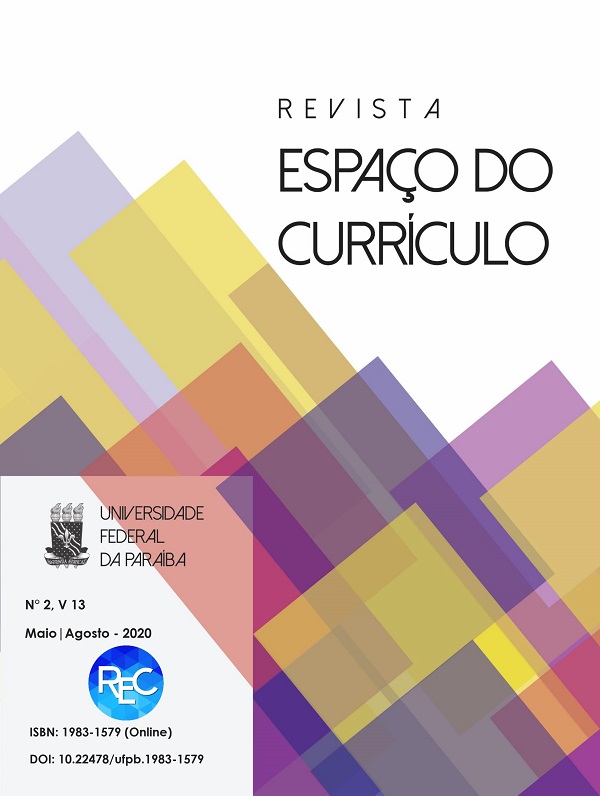THE SCHOOL CURRICULUM FROM THE PERSPECTIVE OF FIELD EDUCATION
possibilities and challenges of pedagogical management
DOI:
https://doi.org/10.22478/ufpb.1983-1579.2020v13n3.37931Keywords:
Rural Education, School curriculum, Pedagogical PracticeAbstract
The text presents the investigation about the curriculum in the rural school in order to understand how the pedagogical practice is linked to the formal curriculum. The research procedures have a qualitative, bibliographic and empirical approach with data collection in the field. The data present in the research were collected through the analysis of the school's formal curriculum, as well as its characteristics and specificities. A questionnaire was applied with semi-structured questions in relation to the school's formal curriculum, pedagogical practice and rural education, for teachers who work in the final years of elementary school and the pedagogical team. Observation was conducted in the four classes of the final years of elementary school to accompany the teacher's pedagogical practice in the classroom, the same was recorded in a field diary according to the following criteria: curriculum content; articulation of general and specific content; and how the knowledge of the field was inserted in the pedagogical practice of the teacher. The bibliographic deepening necessary to support the research brings the ideas of Coll (2000), Libâneo (1994, 2005), Pacheco (2007), Sacristán (1998), Cavalcanti (2011). The discussions in the article are presented in 4 sections: history of the education of the Field, Basis on the notions of curriculum, characterization of the school and the curriculum of the field and concluding are the analysis of the research results.
Downloads
Metrics
References
BRASIL. Decreto n° 7.352, de 4 de Novembro de 2010. Dispõe sobre a política de Educação do Campo e o Programa Nacional de Educação da Reforma Agrária-PRONERA. Brasília. 4 de novembro de 2010.
BRASIL, MEC. Lei n° 9394 de 20 de dezembro de 1996. Estabelece as diretrizes e bases da educação nacional. Brasília, 1996. Disponível em: http://www.planalto.gov.br/ccivil_03/leis/l9394.htm. Acesso em 2 de junho de 2017.
BRASIL, MEC/CEF. Dicionário da Educação do Campo. Rio de Janeiro, São Paulo. 2012.
BRASÍLIA. Diretrizes Operacionais para a Educação Básica das Escolas do Campo. Resolução CNE/CEB de 3 de Abril de 2002.
CAVALCANTI, Albares de Siqueira. Currículo e Diversidade Cultural: uma abordagem a partir do Ensino Religioso nas escolas públicas. Rev. de pesquisa em Filosofia, v1, n.3, maio – ago.2011. Disponível em: http://www.revistafundamento.ufop.br/Volume1/n3/vol1n3-9.pdf. Acesso em 14 de janeiro de 2017.
COLL, César. Psicologia e Currículo: uma aproximação psicopedagógica a elaboração do currículo escolar. São Paulo: Ática, 2000.
LIBÂNEO, José Carlos. Didática. Cortez. São Paulo, 1994.
LIBÂNEO, José Carlos (et.al). Educação Escolar: Políticas, estrutura e organização. Cortez. São Paulo, 2005.
PACHECO, Márcia M. Dias Reis. Currículo, interdisciplinaridade e organização dos processos de ensino. Fundação Hermínio Ometto/Uniararas, 2007.
PARANÁ, MEC/CFE. Diretrizes Curriculares da educação do Campo. Curitiba. 2006. Disponível em: http://www.educadores.diaadia.pr.gov.br/arquivos/File/diretrizes/diretriz_edcampo.pdf. Acesso em 20 de maio de 2017.
PARANÁ, Secretaria Estadual de Educação, Projeto Político Pedagógico. Colégio Estadual do Campo São Luís. São João – PR, 2017.
PARANÁ, MEC/CEF. II Caderno Temáticos da Educação do Campo. Curitiba. Vol.2. SEED- PR, 2009. Disponível em: http://www.educadores.diaadia.pr.gov.br/arquivos/File/cadernos_tematicos/caderno_tematico_campo02.pdf.Acesso em 5 de janeiro de 2017.
SACRISTÁN, J. Gimeneo. O currículo: uma reflexão sobre a prática. Armed – 3 ed. Porto Alegre. 1998.
VERLINDES, Suzani Pletsch; ORZECHOWSKI, Suzete Terezinha. Metodologia da Alternância na Casa Familiar Rural de Chopinzinho. Paraná/Brasil. UNICENTRO, 2016.
Downloads
Published
How to Cite
Issue
Section
License
By submitting an article to Curriculum Space Journal (CSJ) and having it approved, the authors agree to assign, without remuneration, the following rights to Curriculum Space Journal: first publication rights and permission for CSJ to redistribute this article. article and its metadata to the indexing and reference services that its editors deem appropriate.
















